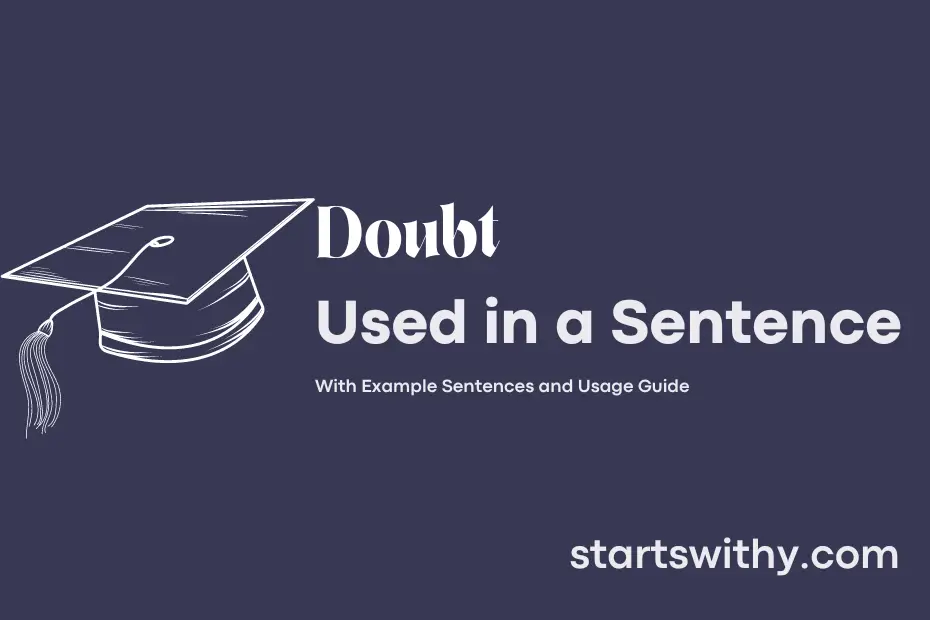“Confusion often lingers when it comes to discerning between ‘doubt’ and ‘indecision.’ Doubt, a feeling of uncertainty or lack of conviction, can cloud our judgment and make decision-making challenging. In contrast, indecision is the struggle to make a choice when faced with multiple options or unclear preferences.”
Exploring the nuances between doubt and indecision can shed light on how these mental states affect our choices and actions. While doubt can stem from skepticism or lack of faith in something, indecision emerges when we grapple with conflicting desires or goals. Understanding these distinctions can lead to more clarity in navigating uncertainties and making sound decisions.
7 Examples Of Doubt Used In a Sentence For Kids
- I doubt the sun will shine tomorrow.
- There is no doubt that elephants are big animals.
- Do you have any doubt about the color of the sky?
- I doubt the birds will sing in the rain.
- Can you help me with my doubt about counting numbers?
- There is no doubt that plants need sunlight to grow.
- I doubt the moon will come out during the day.
14 Sentences with Doubt Examples
- Doubt if you have selected the right major after attending a few classes.
- Ask your professor for clarification if you doubt the instructions for the upcoming assignment.
- Doubt the accuracy of the information you found online for your research paper.
- Always seek clarification from your peers if you doubt your understanding of a complex topic.
- Don’t hesitate to raise your hand in class if you have a doubt about the lecture.
- Approach your seniors for guidance if you doubt your study schedule.
- Discuss your doubts about potential career paths with your career counselor.
- Seek additional resources if you doubt the effectiveness of your current study methods.
- Attend extra tutorial sessions if you doubt your ability to grasp certain concepts.
- Form a study group to address each other’s doubts before exams.
- Reach out to your professors during office hours if you have doubts about the course material.
- Join online forums to post your doubts and engage with other students seeking help.
- Consider seeking academic tutoring if you have recurring doubts about a particular subject.
- Reflect on your doubts and identify areas where you need to focus more to improve your academic performance.
How To Use Doubt in Sentences?
To use the word “Doubt” in a sentence, you can follow these simple guidelines:
-
Noun: When using “doubt” as a noun, it refers to a feeling of uncertainty or lack of conviction about something. For example, “I have a doubt about whether I turned off the stove.”
-
Verb: When using “doubt” as a verb, it means to feel uncertain or lack confidence in something. For example, “I doubt that he will arrive on time.”
-
Expressing Uncertainty: You can use “doubt” to express uncertainty or skepticism about a certain statement or situation. For instance, “I doubt she will pass the exam without studying.”
-
Negation: “Doubt” is often used to add a negative connotation to a statement. For example, “I don’t doubt his intentions.”
-
Disbelief: You can use “doubt” to express disbelief or skepticism. For example, “I highly doubt that story is true.”
Remember to always use “doubt” in context to ensure clear communication. Practice using this word in different sentences to become comfortable with its usage.
Conclusion
In conclusion, sentences containing doubt express uncertainty or lack of conviction. Doubt can arise from a variety of sources, such as skepticism, fear of the unknown, or lack of evidence. These types of sentences often include words like “uncertain,” “unsure,” “questionable,” or “hesitant,” indicating a lack of confidence in the information being conveyed.
When encountering sentences with doubt, it is important to consider the context and underlying reasons for the uncertainty expressed. Whether used for rhetorical effect, to convey skepticism, or to highlight areas of ambiguity, sentences with doubt can prompt critical thinking and further exploration of the subject at hand.



